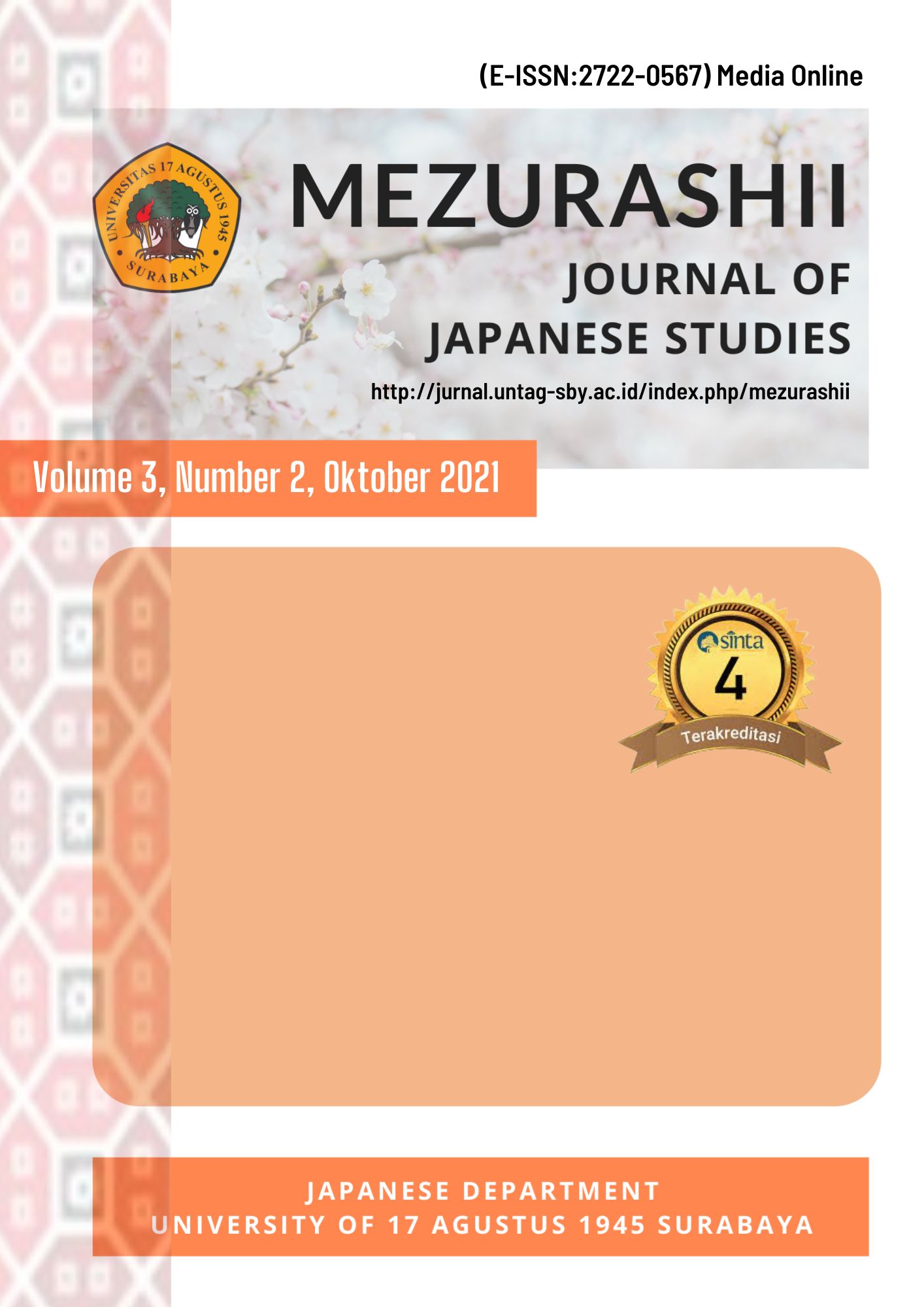Japanese Cultural Values in Doraemon: How Face Threatening Acts Reveal the Implicit Culture of Japan
DOI:
https://doi.org/10.30996/mezurashii.v3i2.4852Abstract
This study is based on a highly popular Manga across Asia, Doraemon. This study aims to find the Face Threatening Acts contained in Doraemon and how these show Japanese cultural values which contradict American values. Previous studies examining Doraemon mostly do not include Face Threatening Acts in the analysis. Furthermore, they also focus more on the explicit culture contained in Doraemon. These are the gaps fulfilled by this study since it aims to examine the implicit culture of Japan using face Threatening Acts contained in Doraemon. The result of this study shows that ‘filial piety’ is the Japanese cultural value mostly shown in the story. This study could be used as the base for future studies to examine whether or not Japanese implicit culture in Doraemon was truly the cause of Doraemon’s unpopularity in Japan.
Downloads
References
List of References
Fatonah, N. (2008). Nilai-Nilai Moral Yang Tercermin Dalam Doraemon.
Fujio, F.F (1970). Doraemon. Retrieved from https://m.manganelo.com/manga-os89986
Fujio, F.F (1970). Doraemon. Retrieved from https://m.mangabat.com/read-tx358664
Filial Piety and Japanese Tales | Spirits, Gods and Ghosts of East Asia. (2017). Retrieved from https://sites.centre.edu/ghostsofasia/2017/01/18/filial-piety-and-japanese-tales/
Itoh, Y. (1991). Socio-cultural backgrounds of Japanese interpersonal communication style. Civilisations, 39, 101–128. https://doi.org/10.4000/civilisations.1652
Lieber, E., Nihira, K., Mink, I. T., & Lieber, E. L. I. (2004). and Children for Challenges of Raising Chinese Immigrants : Quantitative and Filial. Ethos, 32(3), 324–347.
Liu, W. T., Kendig, H. L., & Koyano, W. (2000). Filial Piety, Co-residence, and Intergenerational Solidarity in Japan. Who Should Care for the Elderly?, 200–223. https://doi.org/10.1142/9789812793591_0011
Lubabah, N. (2019). FACE THREATENING ACTs (FTAs) AND POLITENESS STRATEGY IN “AMERICA’S GOT TALENT 2018”. Faculty of Letters and Humanities State Islamic University Sunan Ampel Surabaya
Maeda, D. (2004). Societal filial piety has made traditional individual filial piety much less important in contemporary Japan. Geriatrics and Gerontology International, 4(s1), S74–S76. https://doi.org/10.1111/j.1447-0594.2004.00156.x
Podsatiangool, W. (2017). Why Do Americans Say No to Doraemon ?: Examining Power Relations Between American and Japanese Popular Culture in Intercultural Communication through the Lens of Semiotics. December.
Roberts, J. (1991). Face-Threatening Acts and Politeness Theory. 1–28.
Saputra, M.E. (2016). FACE THREATENING ACT (FTAs) IN THE NICHOLAS STOLLER’S MOVIE “BAD NEIGHBORS” (Thesis). UIN Alauddin Makassar, Indonesia.
Thompson, T. (2014). Face and Politeness. Encyclopedia of Health Communication. https://doi.org/10.4135/9781483346427.n183
Tsutsui, T, Muramatsu, N, & Higashino, S. (2013). Changes in Perceived Filial Obligation Norms Among Coresident Family Caregivers in Japan. Retrieved from https://www.ncbi.nlm.nih.gov/pmc/articles/PMC4163045/
United, T. H. E. (1994). AND THE UNITED BETH-ANN K . COCROFT and STELLA TING-TOOMEY California State University , Fullerton. 18(4), 469–506.
Utami & Udasmoro (2012). Komik Doraemon dalam Penerjemahan Jepang-Indonesia. Retrieved from http://etd.repository.ugm.ac.id/home/detail_pencarian/57646
Viswat & Kobayashi (2008). Cultural Differences in Conversational Strategies. Retrieved from https://immi.se/intercultural/nr18/viswat.htm
Downloads
Published
How to Cite
Issue
Section
License
Authors publishing in the Journal will be asked to sign a Copyright Assignment Form. In signing the form, it is assumed that authors have obtained permission to use any copyrighted or previously published material. All authors must read and agree to the conditions outlined in the form, and must sign the form or agree that the corresponding author can sign on their behalf. Articles cannot be published until a signed form has been received.It is a condition of publication that authors assign copyright or license the publication rights in their articles, including abstracts, to email jurnalmezurashii@untag-sby.ac.id. . This enables us to ensure full copyright protection and to disseminate the article, and of course the Journal to the widest possible readership in print and electronic formats as appropriate.







